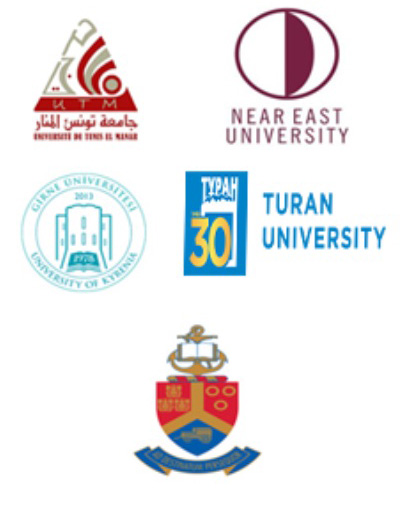Keynote
Prof. Dr. Jesus Garcia Laborda
University of Alcalá, Spain
Keynote Title: “The 17 Sustainable Development Goals through assessment”
Abstract: Assessment has been commonly used just for measuring students’ performance. However, it is common to neglect its powerful effect in improving the students (and to a large extension, the citizenship) quality of life through a good calibration of the students’ potential and needs. Obviously, when addressing groups of population, this leads to a lack of envision of how to improve their lives (objectives 1, 5, 8). Thus, it is necessary to revise the benefits of assessment in education from the individual to collective evaluations to achieve better learning (objective 4). Therefore, on one side, we leave behind the traditional perspective of validation for commercial purposes; on the other, the traditional vision of assessment as a weapon for individual performance. In conclusion, to empower the education of countries where the Sustainable education is a need, we need to revise the procedures we follow in assessment al all levels.
Biodata: Dr García Laborda has a MA in ESL (University of Georgia), MA in English Language and Literature (University of Wisconsin), PhD in English Philology (Universidad Complutense de Madrid) and European Doctorate in Didactics (Universidad Complutense de Madrid). He has been Visiting Scholar at Penn State University and the University of Antwerp, and he has taught postgraduate courses in Lithuania, Cyprus, Turkey, Colombia and Brazil. He has also been the main researcher in four R&D projects and participated in eight more. In 2017-2018 he was Acting Director of the TAEG Knowledge Center (Cyprus) where he currently holds different positions. He has more than 270 published works. Since 2019 he has been the Dean of the Faculty of Education of Universidad de Alcalá, and before that he was the Director of the Department of Modern Philology of the same university (2016-2019). He is currently president of the European Language Association for Specific Purposes. Additionally, he is Editor in Chief of Revitas Encuentro (ESCI / web of Science), Global Journal of Foreign Language Teaching (ESCI / SCOPUS requested), Internal Journal of Learning & Teaching (ESCI / SCOPUS requested) and co-editor of Computer Assisted Language Learning Electronic Journal (SCOPUS), as well as a member of the scientific committee or evaluator of 15 other impact journals (JCR / SCOPUS / ESCI). He is a specialist in language teaching, assessment, educational technology and bilingual education.
Prof. Dr. Ana Campina
University Fernando Pessoa, Portugal
Keynote Title: “Global Governance of Migrations and International Organized Crime: Reality vs Justice”
Abstract: Understanding the nowadays reality regarding the global governance of the international migrations and all the effective consequences in millions of human beings, as well as the close connection and serious influence of the International Organized Crime obliges a serious analysis based in official data. In this concern, within the International Law and Justice and the UN Global Goals for Sustainable Development, mainly the Goal 16 – Peace, Justice, and Strong Institutions – we can state there are a dangerous positions / (re)actions from different Governments / States, around the world, unprotecting millions of migrants. In the same circumstances, the International Organized Crime is an undoubted reality, affecting the migrations globally, supported by different governments, but included in the official rhetoric in a sense that promotes the manipulation of the Public Opinion. Consequently, there are serious social behaviors against the migrants, that is contradictory supported by radical ideologies and manipulated published facts, that promote the discrimination and aggressive behaviors. Worst is the impotent International Justice in preventing and act to judge the responsible persons, governments, and institutions, as the International Criminal Organizations continue growing in dimensions and in crime actions with the Migrations, unpunished. Aiming to persecute the ambitious UN Global Goals, which responsibility is from/for all – international community, states and governments, societies – there are too much information and data controlled that need to be explained supported in facts related in official data from recognized international organizations. This research results are peremptory, these are phenomena impossible to eradicate but need to be effectively controlled avoiding the hardest consequences, as well as, more and more, there is an urgent need to disseminate education for all to be faced based in veracity and not in dangerous tampered data..
Prof. Dr. Carlos Rodrigues
University Fernando Pessoa, Portugal
Keynote Title: “Global Governance of Migrations and International Organized Crime: Reality vs Justice”
Abstract: Understanding the nowadays reality regarding the global governance of the international migrations and all the effective consequences in millions of human beings, as well as the close connection and serious influence of the International Organized Crime obliges a serious analysis based in official data. In this concern, within the International Law and Justice and the UN Global Goals for Sustainable Development, mainly the Goal 16 – Peace, Justice, and Strong Institutions – we can state there are a dangerous positions / (re)actions from different Governments / States, around the world, unprotecting millions of migrants. In the same circumstances, the International Organized Crime is an undoubted reality, affecting the migrations globally, supported by different governments, but included in the official rhetoric in a sense that promotes the manipulation of the Public Opinion. Consequently, there are serious social behaviors against the migrants, that is contradictory supported by radical ideologies and manipulated published facts, that promote the discrimination and aggressive behaviors. Worst is the impotent International Justice in preventing and act to judge the responsible persons, governments, and institutions, as the International Criminal Organizations continue growing in dimensions and in crime actions with the Migrations, unpunished. Aiming to persecute the ambitious UN Global Goals, which responsibility is from/for all – international community, states and governments, societies – there are too much information and data controlled that need to be explained supported in facts related in official data from recognized international organizations. This research results are peremptory, these are phenomena impossible to eradicate but need to be effectively controlled avoiding the hardest consequences, as well as, more and more, there is an urgent need to disseminate education for all to be faced based in veracity and not in dangerous tampered data.

Assoc. Prof. Dr. Melis Seray Özden Yıldırım
Istanbul Kultur University, Turkey
Keynote Title: “The Importance of Resilience Within The Scope of The “Health and Quality Life” Goal in Line with The Global Goals for Sustainable Development”
Abstract: The United Nations’ 2030 Agenda and the sustainable development goals were adopted in 2015. The agenda comprises the 17 sustainable development goals, in total comprising 169 Target and 232 unique indicators. Sustainability refers to the three pillars of sustainability, which refers to environmentally sound decisions, economically viable decisions, and socially equitable decisions.
These goals are titled as follows; no poverty, zero hunger, good health and well-being, quality education, gender equality, clean water and sanitation, affordable and clean energy, decent work and economic growth, industry, innovation and infrastructure, reduced inequalities, sustainable cities and communities, responsible consumption and production, climate action, life below water, life on land, peace, justice and strong institutions, partnerships for the goals. Among these goals, especially health and quality life goal is among the basic subjects of psychology.
In recent years the whole world has been facing many different challenges. The climate changes, demographic imbalances, the wars, migration pressures, economic crises and lately the Covid-19 pandemic are the main ones. Resilience is defined not only as the ability to withstand and cope with difficulties, but also as the ability to go through all lifespan crises with a state of complete well-being.
Biodata: Melis Seray Ozden Yildirim is an Associated Professor in Istanbul Kultur University, which she presently works since 2007. She is a graduate of Istanbul University, department of Psychology and has a PhD degree in Psychology. Her main research interests are family psychology and cyberpsychology. She worked as a head of Psychology Department between 2017-2018 and 2021-2022. She is still the member of the faculty board of faculty of science and letters. Her books are “Dyadic Adjustment in Marriage: Examining Developmental Aspects with Case Examples”, “First Interviews in Infant, Child and Adolescent Cases in Clinical Psychology”, “Family Psychology: Current Issues with Case Studies”. Her articles were published and presented in national and international conferences. She continues carriying out her studies about applied psychology, clinical and developmental psychology.







